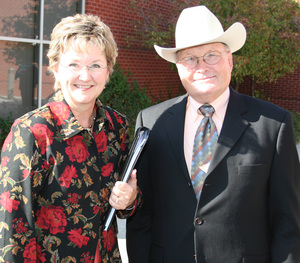Teachers urged to continue focusing on learning, not test results

More than 335 current and future educators attended the Celebrate Diversity in Education Symposium at Chadron State College on Monday. About a third of those in attendance were CSC education majors while most of the others were teachers and school administrators from throughout western Nebraska.
One of the conference’s coordinators, Carol Rempp from the Nebraska Department of Education, said the primary focus was on teaching strategies that can be used to reach all the students. She called it “an amazing conference,” noting that one of the superintendents told her there were so many good sessions, he couldn’t decide which ones to attend.
The keynote speaker was Dr. Lee Jenkins, an educational consultant from Scottsdale, Ariz. He noted that teachers are being challenged by today’s emphasis on test scores, and urged them to continue focusing on improved learning, not improved test scores. He added that improved learning will eventually bring improved test results.
Jenkins said the aim of good management is meeting the needs of individual students and the aim of good leadership is meeting the common needs of all the students. Both are essential, he said.
The speaker also said education cannot be patterned after athletics in which there is often only one winner. He said the aim in the classroom should be to produce as many winners as possible.
Jenkins also cautioned against making dramatic changes in education unless there is evidence that the change will bring improvement.
“Often we experience change without the foggiest notion whether or not it will bring improvement,” said Jenkins. “Sometimes, change is like a rocking horse; there’s lots of movement, but when it is all said and done we haven’t gone anywhere.”
Jenkins added that experience in itself is not always the best teacher, and testing various theories to make sure they will bring improvement is essential.
He also said the No. 1 requirement of leaders should be to create more leaders. He said mentoring programs are helpful in this endeavor. Another responsibility of leaders should be to drive fear out of their organizations.
Following the symposium, Rempp said teachers are experiencing more outside pressures because of the heavy emphasis on testing being placed on them by the No Child Left Behind legislation. She noted that more testing does not help children who are lagging in their education to catch up and it often prevents teachers from having the flexibility to use various strategies that will help children learn.
Rempp added that the After School Program which numerous area schools have adopted after receiving Century 21 grants appears to be helping students who need extra educational support. She said working parents like the program because they know their children are in a safe environment.
In the absence of Nebraska Commissioner of Education Doug Christensen because of illness, the concluding remarks were given by Kandy Imes of Gering, a member of the State Board of Education.
She discussed the four L’s for success that she said were conceived by a friend and are applicable to education. They are, 1, love of your profession; 2, listen to the students; 3, learn by listening and attending conferences such as the one at CSC; and 4, lead by applying the information that has been gained.
Late last week, Christensen and other educators throughout Nebraska were elated that the U.S. Department of Education has given initial approval to the state’s plan for complying with No Child Left Behind. The plan was rejected two months ago, but because of the persistence of Christensen and his staff, federal officials apparently have changed their minds.
In Nebraska, instead of a statewide test, 254 school districts have gone to great lengths to develop their own assessments to track reading and math achievement and believe they have a superior system.
The state must still conduct peer reviews of the individual schools districts’ testing methods and address concerns in testing students who speak limited English, the U.S. Department of Education stated.
Category: Campus News
